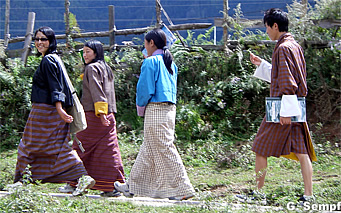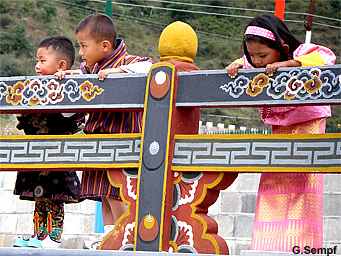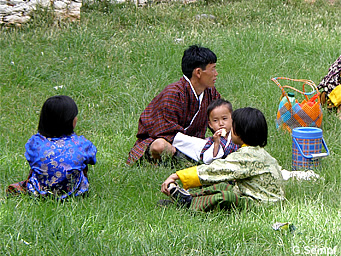 |
Bhutan Education |
|
 |
Bhutan Education |
|
|
 |
| Bhutan's
education system |
| Education and economic empowerment of women in Bhutan |
 |
Study recommends targeted policy interventions to address the gender gap
A greater voice for women in the management of the land they own and access to an effective secondary and higher education along with skills training will go a long way in addressing gender gap concerns in Bhutan. This is the main finding of the report Bhutan Gender Policy Note (GPN) which was launched in Thimpu.
The report prepared by the World Bank in collaboration with the National Commission for Women and Children (NCWC), following extensive stakeholder consultations, reviews the achievements on gender equality achieved so far in Bhutan, identifies areas where more needs to be done, and recommends policy interventions aimed at improving gender equality in Bhutan, which in turn will help in achieving economic growth and shared prosperity.
|
|
|
"The Gender Policy Note has been jointly created as an evidence-based document to cover the critical gender issues of concern in the country," said Lyonpo Dorji Choden, Chairperson, NCWC."It will help organizations like ours and other key national agencies to advocate for greater attention to gender equality and more action by all stakeholders," she added.
Bhutan has undergone a major socio-economic transformation over the past few decades. The per capita income has grown steadily from $340 in 1980 to $5570 in 2011. Significant progress has been made towards achieving gender equality and other areas of human development: in education, enrollment in primary schools stood at 88 percent in 2008 as against 1 girl enrolled for every 50 boys in 1970; maternal mortality has dropped dramatically from 1000 in 1990 to 180 in 2010; women are an almost equal partner in the labor force in Bhutan. Yet despite the progress, a few deep-rooted cultural restrictions have not allowed women to bridge the gap and help Bhutan achieve gender equality.
"Bhutan has made tremendous progress in female labor force participation, but the quality of jobs for women is still an issue. Improving job quality and productivity for women would enhance gender equality and promote economic growth," said Genevieve Boyreau, Resident Representative and Senior Country Economist, The World Bank.
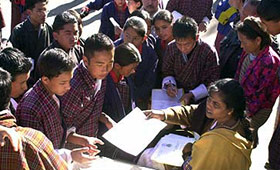 |
Owing to the matrilineal inheritance practice in large parts of Bhutan, about 60 per cent of rural women and about 45 per cent of urban women have land and property titles registered in their name. This asset however does not translate to an economic advantage for the women as land is not used as collateral for access to finance and land-ownership at times also becomes an obstacle for migration of women to better opportunities for work and skill acquisition.In addition, the male still holds the decision making power. |
|
The Labor Force Survey of2011 show that although there was little gender disparity in terms of overall employment - 72 percent males and 67 per cent females - the quality of jobs done by women was an issue. They were generally employed in low paying agricultural jobs and those employed in non-agricultural sector earned almost 25 per cent less than the males.Moreover, the primary responsibility of the woman was taking care of household chores and children, thus resulting in them not acquiring the requisite education and skills training to get better jobs.
The report recommends targeted policy interventions in the following areas:
• Women should actively manage the land they own for better business opportunities and be economically empowered.
• Girls should be encouraged and supported to complete secondary and tertiary education and provided access to vocational and life-skills training tailored for women which could provide them better quality jobs.
• Social norms about gender roles in households should be addressed.
A greater role for men in sharing the housework and taking care of the children. Basic literacy among women should be improved to encourage more open attitudes, awareness of rights and be part of the larger community.
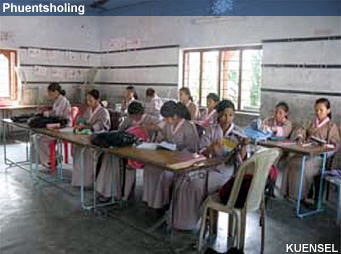 |
"Bhutan has done a terrific job in improving gender equality over the past few decades and is now one of the most gender equal countries in Asia.It has the potential, despite the cultural restrictions, to make even greater achievements in gender equality, and be among the leading nations of the world," said Andy Kotikula, Senior Economist, Gender and Development Group, World Bank and lead author of the Note."Going forward, Bhutan should address the remaining gender gaps through targeted policy interventions and design them to fit the socio-economic conditions in the country, in order to achieve maximum effectiveness," he added. |
|
 |
Source:
World Bank, December 2014 |
top
| Focus on Bhutan's Education System |
 |
 |
Primary School
|
Lower Secondary School |
Higher Secondary School |
College education University |
|
|
|
|
|
 |
| more information on Bhutan |
 |
| Links |
 |
 |
 |
External
links |


